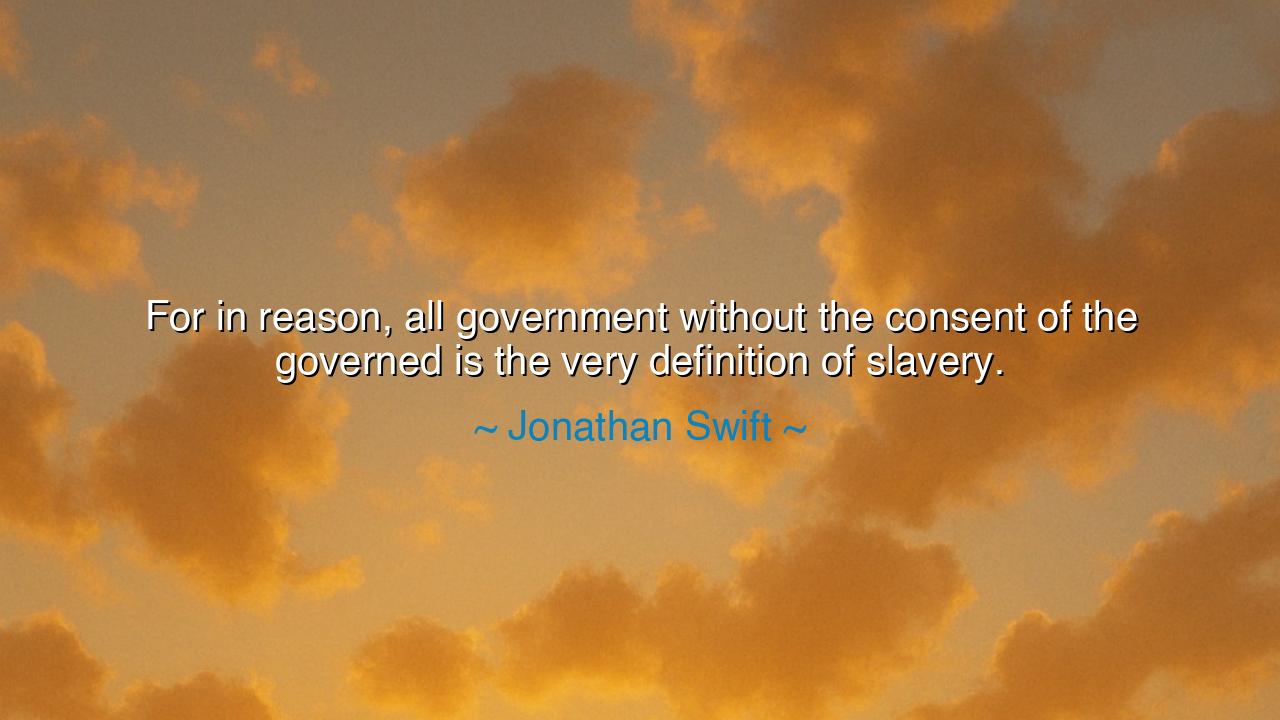
For in reason, all government without the consent of the governed
For in reason, all government without the consent of the governed is the very definition of slavery.






In the searing words of Jonathan Swift, the satirist who wielded truth like a blade, we find a timeless warning: “For in reason, all government without the consent of the governed is the very definition of slavery.” These words were not spoken in comfort, but in defiance—born from an age of kings who ruled by divine right and parliaments that ignored the cries of their people. Swift, with the sharpness of intellect and the courage of conscience, spoke against the notion that power could be justly exercised without consent. His message resounds through centuries: a government that rules without the will of its people does not govern—it enslaves.
To Swift, reason itself reveals this truth. When men and women are bound by laws they did not choose, taxed without their voice, and commanded without their agreement, they are no better than captives wearing invisible chains. Such government without consent is tyranny disguised in ceremony. It might speak of order, stability, and tradition, but beneath its polished mask lies the cold heart of oppression. Freedom, he reminds us, is not the gift of kings—it is the birthright of every human soul. And any authority that denies this truth stands in rebellion not just against man, but against reason itself.
The world has borne witness to this principle in fire and blood. Consider the story of the American Revolution—a living echo of Swift’s warning. For decades, the colonists of America were bound by British laws and taxes they had no part in shaping. They sent petitions, not armies; arguments, not bullets. Yet their pleas for representation were met with arrogance. So they rose, declaring that governance without consent is tyranny, and that obedience without liberty is slavery. Their cry—“No taxation without representation”—was not mere rebellion, but reason demanding justice. In the end, their victory was not just for a nation, but for a principle eternal: that power must answer to the governed.
Even before America’s birth, others had suffered under the same yoke. In ancient Rome, the emperors cloaked dictatorship in the illusion of the republic, claiming to serve the people while ruling them by fear. The poet Juvenal lamented that citizens had traded their liberty for “bread and circuses.” So too in Swift’s time, England’s Irish subjects endured the laws of a foreign parliament, their land taken, their voices silenced. Swift himself, through works like A Modest Proposal, cloaked his outrage in irony, exposing the monstrous logic of rulers who treated the poor as less than human. His quote was not theory—it was a mirror held up to the cruelty of unchecked authority.
The heart of his wisdom lies in the sacred bond between ruler and ruled. Consent of the governed is not mere procedure—it is the moral foundation of society. It transforms power from domination into duty, from control into service. Without it, the state becomes a master and the people, slaves. With it, even the humblest citizen stands as sovereign in spirit. A just government, therefore, must not only command but also listen; not only protect but also respect. The ruler who governs without consent builds his throne upon the sand.
And yet, the danger of silent slavery remains ever near. Many today live in nations where they may vote, but their voices are drowned in corruption, fear, or apathy. Consent must be informed, active, and free, or it is a hollow word. The chains Swift condemned do not always clink—they sometimes glitter, disguised as comfort, convenience, or obedience. When people surrender their conscience to leaders, they forge their own fetters. Freedom dies not in battle, but in silence.
So let every generation remember: to be governed justly is to be heard, to be valued, and to be free to choose. When power demands obedience without consent, it demands slavery. The lesson is not only political but personal—never yield your moral freedom to any voice that silences your own. Question what governs you: not only your rulers, but your habits, your fears, and your indifference.
In the end, Swift’s words ring like a bell calling across ages: “All government without the consent of the governed is the very definition of slavery.” Let them awaken courage in your heart. Stand as one who is governed only by reason and justice, not by fear or deceit. Participate, speak, question, and vote—not as a privilege, but as an act of liberation. For the truest chains are those we choose not to break, and the truest freedom begins when we dare to say, “I consent—or I do not.”






AAdministratorAdministrator
Welcome, honored guests. Please leave a comment, we will respond soon